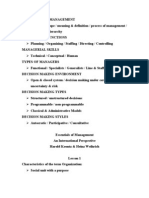
Principles and Practice of Management - Brief Notes on Issues and Themes - Learning Objectives of Each Chapter Preview the book Part 1: The Basis of Global Management Theory and Practice 1. Decision Making Learning Objectives • Analyze decision making as a rational process • Develop alternative courses of action with consideration of the limiting factor • Evaluate alternatives and select a course of action from among them • Differentiate between programmed and nonprogrammed decisions • Understand the differences between decisions made under conditions of certainty, uncertainty, and risk • Recognize the importance of creativity and innovation in managing Part 3: Organizing 7. Part 4: Staffing 11. Managing Change through Manager and Organization Development Learning Objectives • Distinguish between manager development, managerial training, and organization development • Discuss the manager development process and training • Describe the various approaches to manager development • Identify changes and sources of conflict and show how to manage them • Describe the characteristics and process of organization development • Understand the learning organization Part 5: Leading 14.
Human Factors and Motivation Learning Objectives • Define the nature of leading and leadership • Describe the basic human factors that affect managing • Explain the meaning of motivation • Describe the various theories of motivation and their strengths and weaknesses • Analyze motivational techniques, with emphasis on the role of money, participation, the quality of working life, and job enrichment • Present a systems and situational approach to motivation 15. Leadership Learning Objectives • Define leadership and its ingredients • Describe the trait approaches and charismatic leadership approach and their limitations • Discuss various leadership styles based on the use of authority • Identify the two dimensions of the managerial grid and the resulting extreme leadership styles • Recognize that leadership can be seen as a continuum • Explain the contingency approach to leadership • Describe the path–goal approach to leadership effectiveness • Distinguish between transactional and transformational leaders 16. Committees, Teams, and Group Decision Making Learning Objectives • Explain the nature of various types of committees and groups • Outline the reasons why committees and groups are used, with special attention to their use in decision making • Present the disadvantages of committees, especially in decision making • Discuss the requirements for using committees effectively • Explain various group concepts • Understand the nature of teams, team building, self-managing teams, and virtual teams • Recognize conflict in committees, groups, and organizations 17.
A Course Material on PRINCIPLES OF MANAGEMENT By. Harold Koontz, Heinz Weihrich, ‘Essential of Management’, Tata Mcgraw Hill. Management is essential in.
Fxphd torrent download pc. Communication Learning Objectives • Describe the purpose of communication and the basic communication process • Explain the flow of communication in an organization • Describe the characteristics of written, oral, and nonverbal communication • Identify barriers and breakdowns in communication and suggest approaches to improve it • Understand the role of the electronic media in communication Part 6: Controlling 18. Control Techniques and Information Technology Learning Objectives • Explain the nature of budgeting and the types of budgets • Describe zero-base budgeting • Discuss nonbudgetary control devices • Explain time–event network analysis as a major technique of planning and control • Understand the nature and applications of information technology • Recognize the importance of computers in handling information • Explain the opportunities as well as challenges created by the new information technology 20.